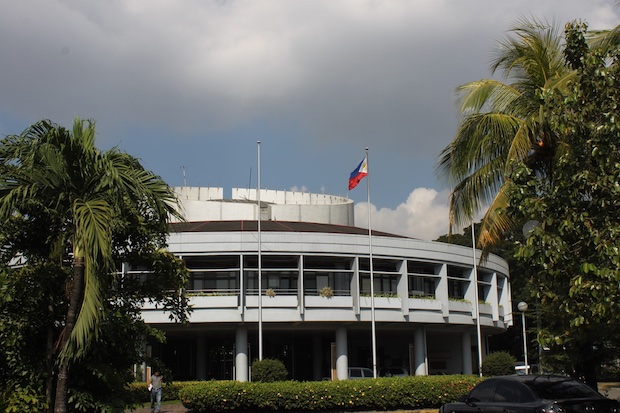Foreign grants aimed at swaying local policy an attack on PH sovereignty – solons

The main office of the Food and Drugs Administration in Muntinlupa. (Photo from the FDA Facebook page)
MANILA, Philippines — Foreign private organizations may try to influence the Philippines’ national policies through grants awarded to government agencies — which is “an attack” on the country’s sovereignty.
Deputy Speaker Deogracias Victor Savellano and Rep. Jericho Nograles of the Puwersa ng Bayaning Atleta party-list group repeated that warning in a statement issued on Monday.
It was the same warning they gave during a congressional hearing conducted last March 16 by the House Committee on Good Government and Public Accountability on the regulation of e-cigarettes and heated tobacco products (HTPs).
At that hearing, the two lawmakers noted that Director-General Eric Domingo of the Food and Drug Administration (FDA) admitted that his agency received grants to support policy development from foreign anti-tobacco groups under the Bloomberg Philanthropies.
“I called for this investigation to find out the truth,” Savellano said at the hearing. “Did the FDA issue specific and pre-defined policies on e-cigarettes and HTPs in exchange for funding from foreign private organizations? Is this the reason why the FDA in its one-sided and less-than-transparent virtual public hearing could not give the public a real opportunity to flesh out important provisions and requirements for the regulation of e-cigarettes and heated tobacco products?”
For his part, Nograles said: “This is not about the FDA only. The bigger issue here is do we allow government agencies to be influenced by monies coming from foreign private organizations? What we are looking at here is a constitutional violation, an attack on the sovereignty of the Republic of the Philippines, our independence itself. That is the big problem.”
‘Grant-for-policy’ strategy?
According to Nograles, several government agencies have received a total of $2.5M from The Union, which is funded by the anti-tobacco advocacy Bloomberg Initiative.
Nograles detailed the grants received by various agencies.
• In 2009, the Department of Health (DOH) received a total of $742,441 for the development and enforcement of local government smoke-free ordinances.
• In 2010, the Metropolitan Manila Development Authority (MMDA) received $206,701 for the same purpose.
• In 2010, the Department of Health received$369,877 for tobacco control policies, the same year the Civil Service Commission (CSC) and DOH Joint Memorandum Circular (JMC) 2010-01 was issued. “I believe that this JMC is also unconstitutional,” Nograles said.
• In 2012, the MMDA again received $180,000 for smoke-free city ordinances.
• In 2013, the DOH received $150,000 for the implementation of tobacco control policies and the CSC received $150,000 to raise awareness of and compliance with the policy to exclude tobacco industry interference.
• In 2014, the DOH received $192,000 for the National Tobacco Control Strategy.
• In 2015, the Department of Education (DepEd) received $158,039 for its tobacco advertising ban campaign.
• In 2016, the CSC received $183,695 and the MMDA received US$160,000.
“The FDA has conducted multiple researches and consultations with different groups, and these groups they consulted with are also funded by The Union and Bloomberg Initiative. There have been multiple instances wherein every time there is an anti-tobacco regulation that comes out of either the FDA or DOH, it coincides with grants coming from Bloomberg,” Nograles noted.
“We cannot treat this as mere coincidence because this happened in [the course of several] years,” he added.
Multiple job orders
Nograles then referred to the statement of FDA Director Anna Rivera during the hearing in which she confirmed that the FDA hired multiple job orders in behalf of The Union and granted different salary grades to these personnel.
“This is the problem. The FDA has received money from a private organization that is opposed to a legitimate industry in the country, and that money was utilized to hire persons as job orders and given salary grades under our laws to conduct anti-tobacco projects,” Nograles said.
Under the Anti-Graft and Corrupt Practices Act and the Code of Conduct and Ethical Standards for Public Officials and Employees, the FDA is not allowed to hire personnel on behalf of The Union, Nograles explained.
“The FDA said that it does not in any way act as an agent of The Union. I agree, but suddenly you are hiring personnel in behalf of The Union. The FDA said that The Union is not a client registering a product. That is correct, but The Union can be influential in blocking the registration of a product,” he said.
Savellano, who represents the tobacco-producing province of Ilocos Sur, criticized the FDA for drafting proposed guidelines on e-cigarettes and HTPs that were even more restrictive than regulations for combustible cigarettes, which his constituents had decried as a de facto ban on these alternative nicotine products.
“As government officials, we are expected to be fair, objective and transparent in issuing and implementing public policies. We hope that through this investigation, we can better protect our independence and sovereignty so that we do not become an easy target for foreign private entities that wish to interfere with our national policies,” Savellano said.
“I understand that the FDA is only doing their job; we are not out to lynch the FDA and other government agencies,” said Nograles. “We want a healthier country, but at the same time we also want our laws to be followed.”